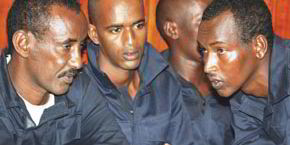The move has raised concerns among the maritime security community who say there has been no rehabilitation program put in place for them.
MAST, the UK-based maritime security company, says Kenya released a number of convicted pirates in July, enabling them to return to their homes in Somalia.
"Released pirates are reportedly seeking work as armed guards in ocean going fishing vessels," said MAST chief operating officer Gerry Northwood OBE.
"This is a potentially risky situation. It is not a big step from providing security on a fishing vessel to taking the vessel hostage and using it as a pirate mothership."
Alan Cole, an official at the United Nations Office for Drugs and Crime, recently expressed concern that illegal fishing in the Indian Ocean and Horn of Africa might be a catalyst for a return to piracy.
His observations were reinforced by the BBC Africa correspondent Andrew Harding, whose interviews of Somalis in Puntland revealed a potentially dangerous sense of resentment that not enough is being done by the international community to prevent illegal fishing and that the risk to reward balance might once again be shifting in favour of piracy.
Northwood says the Indian Ocean is arguably the safest ocean on the planet, but it remains extremely fragile and dependent on international navies maintaining a presence.
"We continue to see speculative approaches by skiffs equipped with assault rifles and ladders. A MAST team recently fired warning shots at a skiff to prevent a boarding attempt in the southern Red Sea.
"Periodically commercial vessels are reporting similar approaches, which demonstrate that the pirate threat remains latent.
"There seems to have been a shift in mood amongst Somalis against piracy in recent months, seeing it as an obstacle to economic opportunity rather than an economic opportunity in itself.
"However, unless there are real opportunities for ordinary Somalis to prosper, the risk to reward ratio will inevitably once again shift in favour of piracy."



